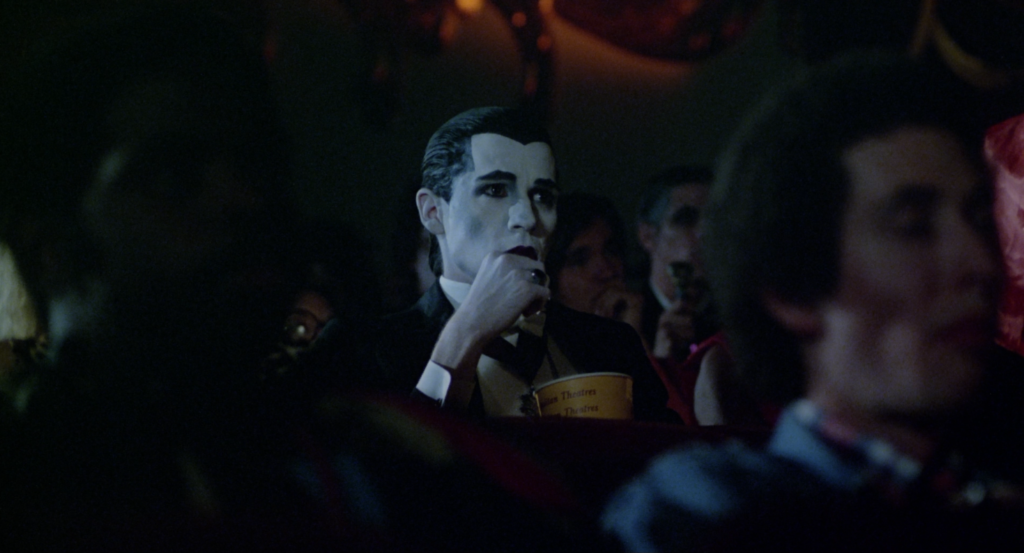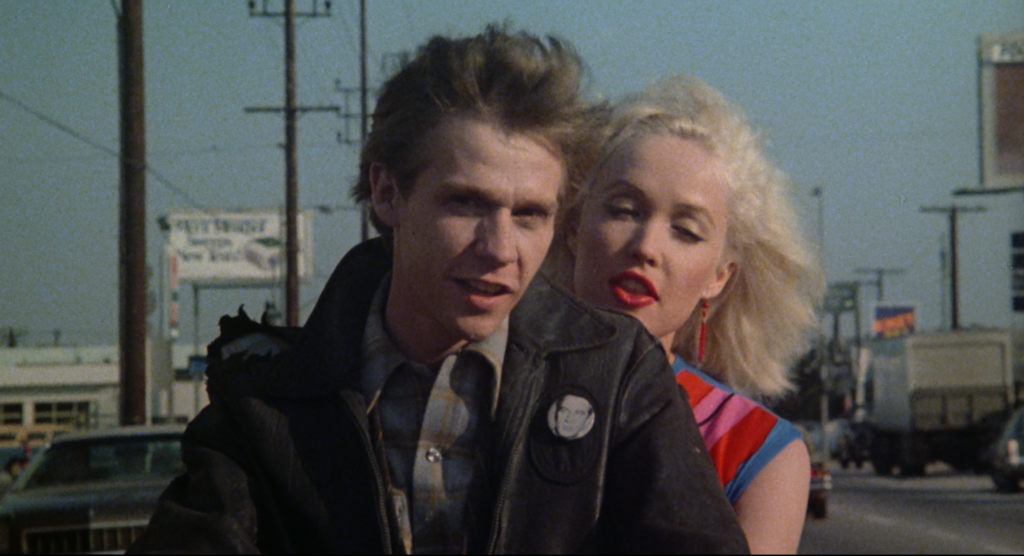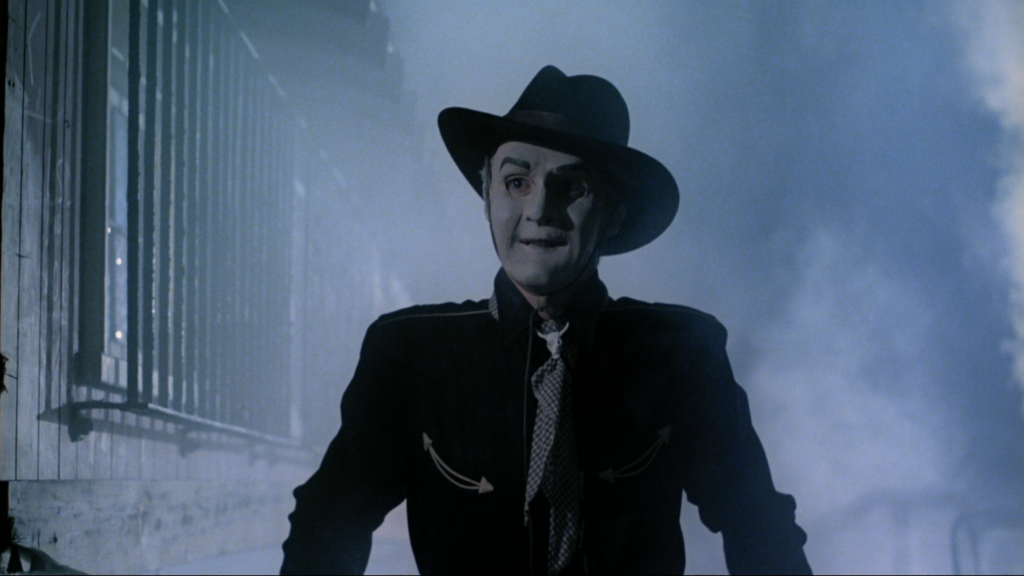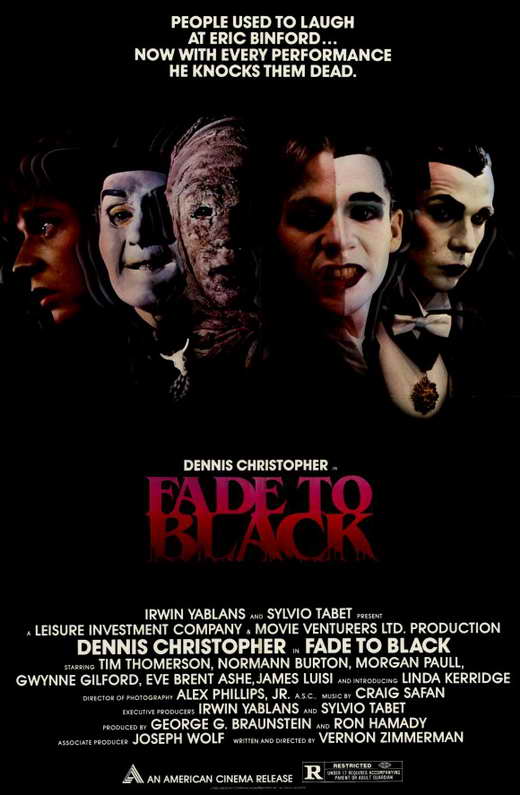
Movie-obsessed Eric Binford (Dennis Christopher, Stephen King’s It) lives with his wheelchair-bound aunt (Eve Brent), spending most of his time inside a womb-like room plastered with vintage celebrity stills and film posters, watching old films on a small black-and-white TV or through a battered film projector. Trivia obsessed and withdrawn, he often adopts the personae of his favorite film characters, in particular Cody “Top of the world, Ma!” Jarrett from White Heat (1949). During the day he works for an L.A. film distributor, surrounded by aisles of film cannisters and bullied by his co-workers (including a young Mickey Rourke). One day he meets an Australian actress (Linda Kerridge, Vicious Lips) desperate for her big Hollywood break, and he’s struck by her resemblance to his celebrity crush, Marilyn Monroe. Amused by his awkward sincerity, she accepts a ride on a rusty scooter on loan from his employer, and they hit it off through their shared love of movies. But when she accidentally ghosts him on their planned meet-up at a movie theater, Eric stumbles into a psychotic spiral. Fed up with his aunt’s nagging, he kills her by rolling her off a tall staircase, deliberately recreating the famous murder in Kiss of Death (1947). He makes himself up as Bela Lugosi’s Dracula for a screening of Night of the Living Dead (1968), and in this disguise stalks a street walker who’d teased him, driving her to an accidental death while images of Christopher Lee’s Count flash in his head. Isolating himself further, he crosses the line into the fantasy world in which everyone has always accused him of living. If he can’t step through the silver screen, he will let it swallow everything around him to get back at his tormentors – while a coke-snorting criminal psychologist (Tim Thomerson, Trancers) and a cop (Gwynne Gilford, Beware! The Blob) try to track him down.

Eric (Dennis Christopher) and Marilyn (Linda Kerridge).
One of the few films directed by Vernon Zimmerman (he also made 1972’s trucker movie Deadhead Miles, written by Terrence Malick), and certainly his best regarded, Fade to Black (1980) is usually framed as a meta-slasher movie, reflexively staging its killings in the context of other movies. But the superb new Blu-ray from Vinegar Syndrome – 4K restored from 35mm negative elements and featuring a slate of special features including a new interview and commentary with a justifiably proud Dennis Christopher – makes a strong argument that Fade to Black is really more of a dark character study and thriller that dons “slasher movie” like just another of Eric’s rotating masks. At times, this is a gangster movie – as with the grand, White Heat-aping finale at Mann’s Chinese Theatre, or in an earlier Tommy gun killing inspired by The Public Enemy and Little Caesar (1931). Certain scenes are played for pure horror, as when Eric transforms into Universal’s Mummy to stalk his boss through a dark warehouse, or in his alleyway confrontation with Rourke, which adds the Western genre into the mix as Eric hideously alters his face to become William Boyd’s Hopalong Cassidy before pulling the trigger. But black comedy is never too far from the surface, as with an obligatory nod to Psycho’s shower scene that here ends in a surreal little joke.

Eric as a deadly Hopalong Cassidy.
But the vampire-themed death, which climaxes with Eric impulsively planting his mouth on his victim’s impaled neck and emerging with his lower face darkened by blood, suggests a more modern and significant reference point: George A. Romero’s Martin (1977). Although Romero leaves the door open to the possibility that his protagonist might really be one of the undead, it’s more important that all the raw, sometimes clumsy murders in that film are distinctly un-supernatural in nature, and that his “vampire” is a troubled young man regardless of his origins. Fade to Black is similarly more concerned with Eric Binford than any of his disguises. Christopher, hot off Breaking Away (1979), is central in driving his performance to deeper and more disturbing places than the film’s premise would suggest – all while maintaining an important degree of audience empathy. He presents prototype elements of antisocial 80’s characters you’d later see played by the likes of Crispin Glover or Fright Night‘s Stephen Geoffreys, but there’s a sliver of charisma here which renders it sufficiently believable that he’d catch the interest of the gorgeous “Marilyn.” I suppose the very extended opening act, which takes its time introducing you to Eric and his world, may make or break those watching this film solely for its horror elements; but the investment of Zimmerman and Christopher in suggesting that this entire story may have gone another way – indeed, might have led to a happy conclusion – is pivotal to underscore the tragedy of what happens next. These passages are so well done that it’s easier to forgive a much more unbelievable subplot involving a Hollywood producer (Blade Runner’s Morgan Paull) who steals one of Eric’s ideas, or the fact that the Tim Thomerson storyline – as fun as Thomerson always is – offers nothing critical to the story, apart from a late-breaking, tossed-off revelation about Eric’s aunt. Over the years, Fade to Black has gone from being a VHS staple to an overlooked and forgotten title in the DVD era. Vinegar Syndrome’s Blu-ray – like their partner label Fun City’s 2020 release of the exceptional, genre-blurring thriller I Start Counting (1969) – highlights the importance of small labels and the physical media format, battling cinematic amnesia and allowing a fresh look at films that were either unfairly dismissed in their time or simply lost in the shuffle.










